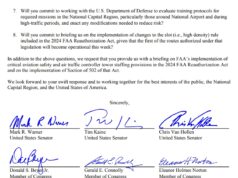As Ryan Nobles reports, Tim Kaine is getting “blow-back…in his direction” following “the release of a scathing audit on the Virginia Department of Transportation,” which found that “[m]ore than $1 billion in state transportation funds were left on the table, while traffic remained bottled up, rest stops were closed and pot holes not filled.” According to Bob McDonnell, not specifically mentioning his predecessor in the governor’s mansion, Tim Kaine, “There was a bad set of management decisions made to be able to keep money in the bank that should’ve been spent.”
Tim Kaine’s response is as follows (bolding added by me for emphasis):
“Typically when an audit is released with such anticipation, it’s because of a discovery that taxpayer dollars are missing. In the case of today’s audit – thanks to tight-fisted project management and sharp reduction in overhead during the toughest economic downturn in a generation – what’s clear is VDOT has cash in the bank to pay for the projects in the Six Year Plan as they are built. That’s good news.
“VDOT reforms enacted by the General Assembly were meant to yield exactly these results – and as intended the available cash has been budgeted to a maintenance or construction project. In 2002, there were $687 million in project deficits and about 10,500 VDOT employees. Today, there is a substantial cash balance and fewer than 7,000 VDOT employees.
“When the McDonnell Administration went to market this past May to sell transportation bonds, they bragged about the smart fiscal management at VDOT. The nation’s top bonding agencies studied the agency’s performance and agreed, rating the VDOT bonds a strong AA credit. The McDonnell Administration’s own Six Year Plan includes sizable cash reserves as a smart strategy for reserving funds for future projects.
“Ultimately the fact that there is money to spend on transportation needs is welcome news for Virginians and for the Commonwealth.”
Senate Majority Leader Dick Saslaw (D) also weighed in, defending Kaine and also explaining the situation. I think Saslaw’s statement makes a lot of sense.
As chair of the Senate Finance Subcommittee on Transportation, I am pleased to see that Governor McDonnell has focused his attention on Virginia’s seriously inadequate transportation funding model and resurfaced many of the audit recommendations made by the Joint Legislative Audit and Review Commission and Auditor of Public Accounts since 2002. While we are happy to see that the audit yielded no evidence of fraud and abuse in VDOT, it is clear that this audit identifies no new funds for transportation. What we do see, however, is an agency with a critical mission, dealing with the loss of over 1,000 employees in an unprecedented era of shrinking state revenues and considerable uncertainty in the availability of future federal funds. Coupled with the immediate challenges of allocating federal stimulus dollars, it appears that some projects may have been slowed down in the process. While no one wants to see funds lying unused, I appreciate that the VDOT management employed a cautious approach during a period of great financial uncertainty and did not over-obligate funds, as we saw under the Gilmore Administration. In fact, legislative requirements that adequate fund balances be accrued to projects prior to the authorization of contracts were put in place to prevent the abuses seen under the Allen and Gilmore administrations. This change, implemented in 2005, received unanimous bipartisan endorsement with even Delegate McDonnell voting for this requirement.
Until my colleagues and I learn more about the details in the audit, I am hesitant to affirm that there are in fact substantial new dollars for transportation. Furthermore, many of the funding recommendations apparently fail to acknowledge the statutory formula through which maintenance dollars are currently allocated, a process which ensures that all areas of the state receive necessary funding for the upkeep of transportation assets. When available balances are “redeployed”, as the Governor suggests, that may mean that some districts are winners and some are losers. Again, we need to see the details. And while I would be pleased to see additional projects go forward, we must understand that these are largely one-time resources. This audit demonstrates that the Commonwealth has yet to face the fact that it lacks a comprehensive long-term plan for solving its transportation problem.“











